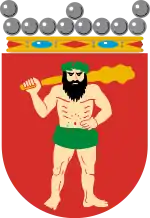Kemi
Kemi (Northern Sami: Giepma; Swedish (historically):Kiemi) is a town and municipality of Finland. It is located very near the city of Tornio and the Swedish border. The distance to Oulu is 105 kilometres (65 mi) to the south and to Rovaniemi is 117 kilometres (73 mi) to the northeast. It was founded in 1869 by a decree of the Emperor Alexander II of Russia because of its proximity to a deepwater port.
Kemi | |
|---|---|
Town | |
| Kemin kaupunki Kemi stad | |
 Clockwise, from top left: Kemi Railway Station, Kemi City Hall, Karihaara School, Café at the inner harbour, and Kemi Church | |
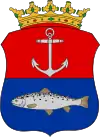 Coat of arms | |
 Location of Kemi in Finland | |
| Coordinates: 65°44′10″N 024°33′49″E | |
| Country | |
| Region | Lapland |
| Sub-region | Kemi–Tornio sub-region |
| Charter | 1869 |
| Government | |
| • Town manager | Tero Nissinen |
| Area (2018-01-01)[1] | |
| • Total | 747.28 km2 (288.53 sq mi) |
| • Land | 95.34 km2 (36.81 sq mi) |
| • Water | 652.1 km2 (251.8 sq mi) |
| Area rank | 300th largest in Finland |
| Elevation | 4 m (13 ft) |
| Population (2020-07-31)[2] | |
| • Total | 20,526 |
| • Rank | 53rd largest in Finland |
| • Density | 215.29/km2 (557.6/sq mi) |
| Population by native language | |
| • Finnish | 98% (official) |
| • Swedish | 0.1% |
| • Others | 1.9% |
| Population by age | |
| • 0 to 14 | 14.2% |
| • 15 to 64 | 66.5% |
| • 65 or older | 19.3% |
| Time zone | UTC+02:00 (EET) |
| • Summer (DST) | UTC+03:00 (EEST) |
| Postal code | 94100 |
| Municipal tax rate[5] | 20.75% |
| Website | www.kemi.fi |
Kemi is situated on the Bothnian Bay, at the mouth of the river Kemijoki, and it is part of the Lapland region. The town has a population of 20,526 (31 July 2020)[2] and covers an area of 747.28 km2 (288.53 sq mi) of which 652.1 square kilometers (251.8 sq mi) are water.[1] The population density is 215.29 inhabitants per square kilometre (557.6/sq mi).
World War II hostage crisis
During World War II, after Finland signed the Moscow Armistice and found itself involved in the Lapland War against its former German ally, German forces at the beginning of October 1944 captured 132 Finnish civilian hostages in Kemi (as well as 130 in Rovaniemi) and threatened to kill them unless the Finnish army released the German POWs captured in the Battle of Tornio. However, Finland refused to comply and threatened to retaliate by killing the German POWs. The hostages were released unharmed on October 11, 1944, near Rovaniemi.
Sights
Kemi has a claim to fame as the home of the world's largest snow castle[6] (reconstructed every year to a different design). The SnowCastle of Kemi is usually built in the inner harbor of the city.
A model of The Crown of Finland (the original was never made for the King of Finland) is kept in the town's gemstone gallery. It also houses replicas of the Imperial State Crown of Great Britain, the scepter of the Czar of Russia, the Orbs of Denmark, and the diamond necklace of Marie Antoinette, among other items.
Additional attractions include:
- Kemi church
- Kemi Gemstone Gallery
- Icebreaker Sampo
- The sailship Jähti
Economy
The main economic activity in Kemi is centered on two large paper and woodpulp mills and on the only chromium mine in Europe (which supplies the Outokumpu ferrochrome plant in Tornio).
The Chinese company Kaidi has announced plans to build the world's first second-generation biomass plant in Kemi, scheduled to begin operations in 2019.[7][8]
In April 2007, the city of Kemi laid off all of its municipal workers for 2 weeks due to the failing economy of the city. Spiraling specialist healthcare costs and a fleeing industry tax base are stated as the cause for the firing.[9] These are the most drastic temporary dismissals to take place in Finland since 2000.
Education
A polytechnic university of applied sciences is situated in Kemi.
Culture
Kemi is the hometown of the power metal band Sonata Arctica.
Politics
Results of the 2019 Finnish parliamentary election in Kemi:[10]
- Left Alliance 26.2%
- Social Democratic Party 23.6%
- The Finns Party 19.8%
- Center Party 13.6%
- National Coalition Party 7.2%
- Green League 5.1%
- Movement Now 1.8%
- Christian Democrats 0.7%
- Communist Worker‘s Party - For Peace and Socialism 2,7%
Transportation
Kemi railway station is an intermediate station on the railway between Lapland and Helsinki. It is operated by VR. The junction of the Kolari and Rovaniemi lines lies to the north of Kemi station.
Finnish national road 4 and European routes E8 and E75 run through the town.
Kemi-Tornio Airport is located 4.5 kilometers (2.8 mi) north of Kemi city center.
The Port of Kemi is a cargo port handling containerised and bulk cargo as well as oil and petrochemical products.[11]
Town manager
| Town manager | Term |
|---|---|
| Olli Nylander | 1930-1956 |
| Risto Hölttä | 1956-1966 |
| Taisto Jokelainen | 1967-1980 |
| Juhani Leino | 1980-2000 |
| Kalervo Ukkola | 2000-2005 |
| Ossi Repo | 2006-2012 |
| Tero Nissinen | 2012-2021 |
| Matti Ruotsalainen | 2021- |
International relations
Twin towns – sister cities
Kemi is twinned with:
 Tromsø (Norway), since 1940
Tromsø (Norway), since 1940 Volgograd (Russia), since 1953
Volgograd (Russia), since 1953 Liptovský Mikuláš (Slovakia)
Liptovský Mikuláš (Slovakia) Newtownards (Northern Ireland)
Newtownards (Northern Ireland) Székesfehérvár (Hungary)[12]
Székesfehérvár (Hungary)[12] Luleå (Sweden)
Luleå (Sweden)
Notable residents
- Juhani Paasivirta (1919 – 1993), historian
- Ensio Seppänen (1924 – 2008) sculptor, professor
Gallery
 Kemi Church, May 2007
Kemi Church, May 2007 Meripuistokatu street with the Kemi City Hall in the background
Meripuistokatu street with the Kemi City Hall in the background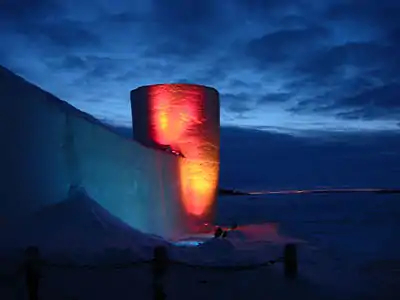 Kemi SnowCastle
Kemi SnowCastle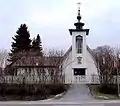 Saint John the Baptist Orthodox Church in Kemi
Saint John the Baptist Orthodox Church in Kemi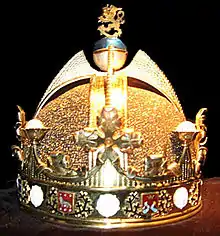 The Crown designed for the King of Finland
The Crown designed for the King of Finland
See also
References
- "Area of Finnish Municipalities 1.1.2018" (PDF). National Land Survey of Finland. Retrieved 30 January 2018.
- "Suomen virallinen tilasto (SVT): Väestön ennakkotilasto [verkkojulkaisu]. Heinäkuu 2020" (in Finnish). Statistics Finland. Retrieved 13 September 2020.
- "Population according to language and the number of foreigners and land area km2 by area as of 31 December 2008". Statistics Finland's PX-Web databases. Statistics Finland. Retrieved 29 March 2009.
- "Population according to age and gender by area as of 31 December 2008". Statistics Finland's PX-Web databases. Statistics Finland. Retrieved 28 April 2009.
- "List of municipal and parish tax rates in 2011". Tax Administration of Finland. 29 November 2010. Retrieved 13 March 2011.
- "Pictures of the day: 4 February 2011". The Telegraph. February 4, 2011. Retrieved 25 March 2018.
- Nilsen, Thomas (February 10, 2017). "Chinese company to build giant bio-diesel refinery in Kemi". The Barents Observer. Retrieved April 1, 2017.
The Chinese company Kaidi announced the plans on Wednesday. The refinery will be the world’s first so-called second generation biomass plant [...] 75 percent of the fuel will be biodiesel and 25 percent biogasoline, the company says. Energy wood will be the main feedstock, but also harvesting remains and leftover bark from Lapland’s forest industry will be utilized. The plan is to have commercial production by 2019 and means a huge boost to local employment in the Kemi region with over 150 permanent positions.
- Gudjonsson, Heidar; Nielsson, Egill Thor (March 31, 2017). "China's Belt and Road Enters the Arctic". The Diplomat. Retrieved April 1, 2017.
A reported $1.1 billion investment by China’s Kaidi into a biodiesel plant in Kemi, Finland is significant.
- "Northern city of Kemi to lay off all municipal workers for two weeks". Helsingin Sanomat – International Edition. Helsinki: Helsingin Sanomat Oy. 2007-04-24. Retrieved 7 January 2009.
- "Eduskuntavaalit 2019, Kemi". Oikeusministerö - Tieto- ja tulospalvelu. 23 April 2019. Retrieved 27 April 2019.
- "Port of Kemi". PortOfKemi.fi. Retrieved 3 October 2020.
- Bozsoki, Agnes. "Partnervárosok Névsora Partner és Testvérvárosok Névsora" [Partner and Twin Cities List]. City of Székesfehérvár (in Hungarian). Archived from the original on 2012-12-08. Retrieved 2013-08-05.
External links
| Wikimedia Commons has media related to Kemi. |
- Town of Kemi – Official website
 Kemi travel guide from Wikivoyage
Kemi travel guide from Wikivoyage- Kemi SnowCastle – The world's biggest snowcastle
- Sampo Tours – The world's only Arctic Icebreaker for tourist cruises
- Webcam to Snowcastle site (Inner Harbour)
